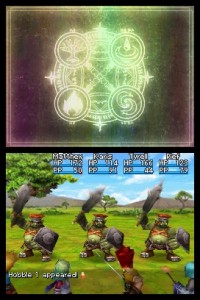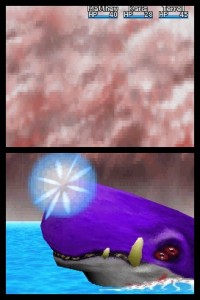
Despite being turn-based, battles move surprisingly quickly.
Being adepts, every party member can use psynergy both in and out of battle. In dungeons you might need to use the wind adept, Karis’s, powers to create whirlwinds, or find a water adept that can freeze pools of water. It’s nothing new to the series, but there a few new types of psynergy that are used in interesting ways to solve puzzles, like Matthew’s “Grip” spell that summons a giant hand to use as a makeshift grappling hook. There are no particularly challenging puzzles, though, and too often they rely on things like pushing boxes around and rolling logs — boring mechanics that were already done to death in the first two games. The psynergy characters have access to varies based on what elemental “Djinn” they have set to them. Like in the first two Golden Sun games, setting particular combinations of the four types of Djinn to characters changes their class, beefing up their stats and giving access to different psynergy. Djinn can be unleashed in battle to use special abilities, but doing so will put them on standby — nullifying any stat bonus for a few turns and potentially changing your character’s class. It’s not unusual for an RPG to have a class system, but Dark Dawn’s is interesting because the mechanic of setting or using Djinn has a nice risk vs. reward feel to it. It’s just a shame that —aside from a small fold-out chart in the game’s box— the game doesn’t explain the class system that well, so finding a class that works effectively boils down to trial and error.
As well as being used to attack and change class, putting Djinn on standby allows your characters to summon massive beasts to pull off a two-screen filling attack and give a boost to their elemental power. The downside is that any Djinn used in the summoning will be useless for a few turns, so again it comes back to the whole risk vs. reward thing. Still, you’ll want to use summons a lot, not just because they’re powerful, but also because the summoning sequences are some of the best looking things you’ll see on the DS. It’s not just the summons that look good, though; Dark Dawn as a whole is quite an eye-catching game. The first two Golden Sun games were pushing what the Game Boy Advance hardware could do, with a camera that panned around in battle and tonnes of pretty particle effects, and so Dark Dawn continues this trend by setting a new benchmark for what developers can accomplish with the DS’s seemingly limited graphics capabilities.

The Roman God, Neptune, is generally depicted as a bearded old man with a trident. In Dark Dawn, he’s a four-eyed whale that fires lasers. And it’s awesome.
If what I tried to explain about the battle system sounds familiar to you, that’s because it’s almost completely the same as the other Golden Sun games. In fact, the same could be said for Dark Dawn’s gameplay as a whole. If you’re looking for any innovation, you won’t find it here, though to Dark Dawn’s credit, it does fix a few problems that plagued the original two games. Though your characters’ inventories are still limited, the DS’s touch screen makes it a lot easier to navigate menus and swap items between characters. The touch screen can also be used to move around like in The Legend of Zelda: Phantom Hourglass, but it doesn’t really add anything. Random encounters are also less of a hassle; they don’t seem to be as frequent and are even removed altogether in some areas of dungeons where your main focus should be on solving puzzles — something I wish more RPGs would do. Another feature Dark Dawn has that I wish more RPGs on the DS would use is the ability to save your progress anywhere outside of battle, which is really a no-brainer for a handheld RPG.
Motoi Sakuraba returned to work on Dark Dawn’s soundtrack, so it sounds very similar to his work on the previous two Golden Sun games, not to mention the Mario Golf and Tennis games that were also developed by Camelot. As a whole, I thought the music was fairly forgettable, but Sakuraba has shown with games like Baten Kaitos and Eternal Sonata that he can compose quality battle themes and Dark Dawn is no exception — every battle plays out like a rocking symphony of pulsing drum beats, synth organs and chirpy menu noises. Like the music, the sound effects are all similar. Some even sound like they were lifted from the Game Boy Advance games. The scratchy sound that accompanies dialogue also returns, though it can be turned off it annoys you too much (and it will).
Golden Sun: Dark Dawn is one of those rare RPGs where the random encounter music never overstays its welcome
The main quest clocks in at about 30 hours, which is a decent length for an RPG. There are a bunch of hidden Djinn and summons to find, but doing so is almost impossible without a guide. At two points in the game, Matthew and company are locked out of parts of the continent and are unable to return there for the rest of the game, so if you miss one Djinn and move on to a new part of the world, there’s no way to get back. This makes Dark Dawn a completionist’s nightmare, especially considering that some Djinn only appear as random encounters on certain areas of the world map. There are also a few bonus dungeons and optional bosses that can be reached after the credits roll, providing a bit more length and tougher challenges than the main game, which is definitely a good thing because as a whole the game isn’t particularly difficult. Sure, it’s good for gamers who might just be getting into RPGs, but considering the game seems designed to appeal to Golden Sun veterans, it seems a bit too easy.
Golden Sun: Dark Dawn isn’t a bad game by any means, but it comes off as being too generic. Nearly ever element of Dark Dawn’s design has been done on the DS before, only better. Battles, while enjoyable, lack the innovation of The World Ends With You or Shin Megami Tensei: Devil Survivor. Djinn collecting just isn’t as charming or addictive as raising monsters in Pokemon or Dragon Quest V. And if you’re looking for a challenge, you’re probably better off with something like Etrian Odyssey. Overall, Golden Sun: Dark Dawn feels too derivative of both the previous Golden Sun games and Japanese RPGs as a whole to really stand out much. The poor writing and irritating fetch quests don’t do Dark Dawn any favours, either. Sure, the game’s visuals might be enough to satisfy some gamers and it certainly does a good job of continuing the Golden Sun series, but the bottom line is that on a console that’s already overcrowded with RPGs, Golden Sun: Dark Dawn does very little to make this quest worth your time.
Score: 7/10